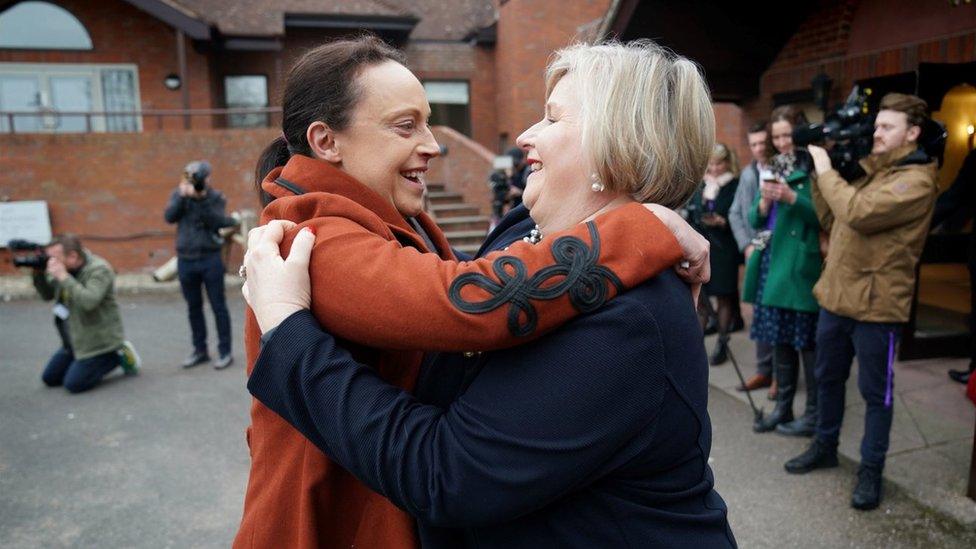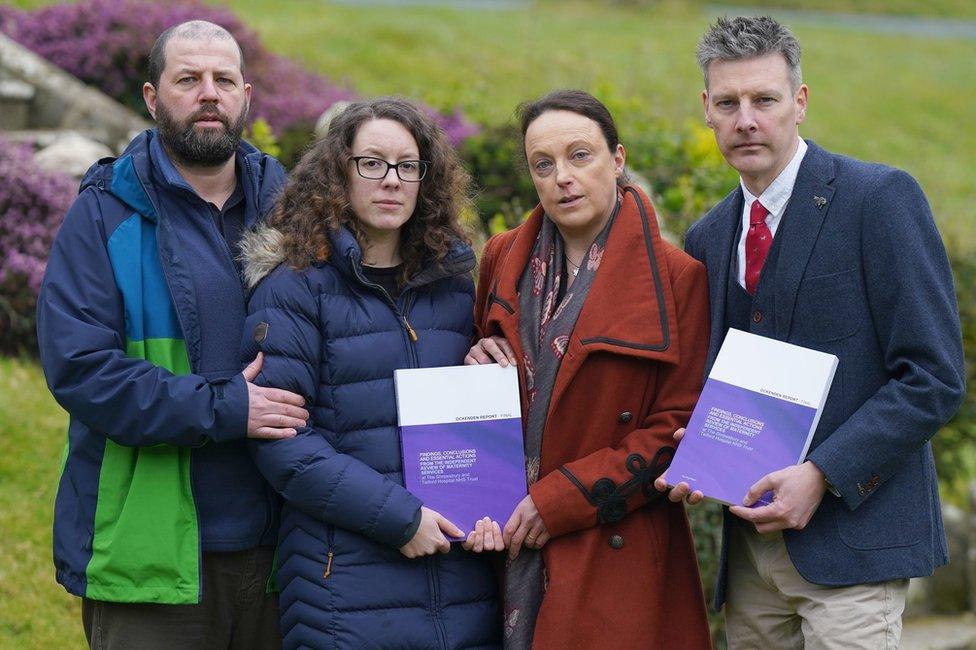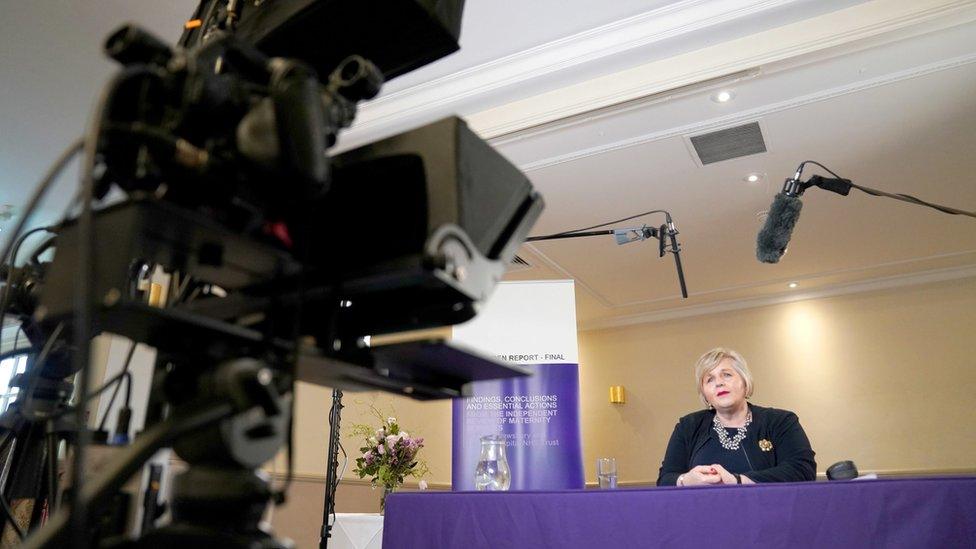Shrewsbury maternity report: Uncovering the biggest NHS maternity scandal
- Published

Rhiannon Davies (left) lost her daughter in 2009. She embraced Donna Ockenden after she published her report on Wednesday
A damning report this week revealed the catastrophic failings at an NHS trust, where at least 201 babies and nine mothers might have survived with better maternity care. Michael Buchanan has led the BBC's investigation into the scandal and first reported concerns five years ago, but he says he's not done in Shrewsbury yet.
I received a call from my brother on Monday. "Where are you?" he asked. When I told him I'd just arrived in Shrewsbury, he said: "Are you not finished there yet?" It's a reasonable question for him to ask - there aren't many stories that a news journalist continues to cover for five years. But this has not been a normal story.
The avoidable death or injury to babies and mothers has revealed to me a callous disregard for human life that I thought the medical profession was incapable of. Mistakes happen, but to lie about them to the families, to dismiss their concerns and to refuse to investigate the errors is unforgivable. There are people I've met and details of catastrophic experiences that I'll remember to my dying days.
The initial tip-off
The original tip-off - that maternity care at Shrewsbury and Telford NHS Trust was seriously poor - came by chance, in 2016. I can't even remember the story I was covering, but I'd approached grieving parents and campaigners Richard Stanton and Rhiannon Davies - who'd lost their daughter in avoidable circumstances at the trust in 2009 - to do a short news interview.
As I was leaving their home, Richard asked if I would be interested in looking at the wider issues with maternity care at Shrewsbury and Telford. By this point, the couple, working alongside Kayleigh and Colin Griffiths, who lost their daughter in 2016, had complied a list of 23 cases they thought displayed signs of preventable harm.
What struck me in that initial conversation was Richard and Rhiannon's utter conviction that there was a huge problem. They'd fought a crippling, exhaustive, seven-year battle to get the trust to accept the failings in the care of their daughter, Kate. But instead of walking away, here they were urging me to look into the deep-seated problems they believed existed.

Colin and Kayleigh Griffiths (left), and Rhiannon Davies and Richard Stanton (right) helped uncover failings at the trust
Working with a brilliant colleague, Sophie Woodcock, we spent three months investigating the trust before we did our first story. At one point we spent two days at the library in Shrewsbury going through old paper copies of the local newspaper, the Shropshire Star, to find inquests they'd reported on. We requested records from the coroner's office to find official causes of death, and I spent three days driving around Shropshire trying to find people we thought might know something. Some were wary of a door knock. Not everyone welcomed the approach. But all appreciated what we were trying to do.
There are still some stories I heard in those early days that I will never be able to tell. One is of a quiet father who has never done an interview with me, and never will. Our chat lasted barely half an hour, and he used few words. But his pauses and his eyes -particularly his eyes - told me everything I needed to know and revealed years of grief and struggle. The memory of it has brought tears to my eyes as I write this.
The first report
While the list of 23 incidents we'd been given was strong, it was over a long period of time - 16 years - and we were constantly questioning if the trust was any worse than elsewhere. As strange as it seems in light of this week's conclusions, Sophie and I were cautious, hence the three-month investigation. Crucially we were aware that if we splashed with the story, it could have a huge unsettling impact on women who were currently pregnant in Shropshire.
Towards the end of one of those agonising conversations, we looked at a spreadsheet we'd been compiling. That's when we knew. We realised that seven of the avoidable deaths we had found had taken place in just 20 months, with two further suspicious deaths (which were later found to be avoidable) in the same time period. The same problem, the failure to properly monitor the baby's heart rate, was a contributory factor in several of them.

More from Michael

After we'd broadcast our first couple of stories, our lives became a little easier. Our coverage was widely picked up by the rest of the media and we started seeing comments on websites from families we'd not heard of, indicating their own poor care. We followed up on those posts and soon any doubt that this was a trust with significant maternity problems evaporated. Over the coming months, I met about 10 families who had also lost a baby, had a disabled child, or were living with the consequences of a maternal injury.
The reaction of the trust, and its boss NHS England, also convinced me that I was on to something. In their first interview with me - before we'd broadcast our first story - a senior clinician spent 40 minutes explaining how data indicated the trust wasn't any worse than others in the West Midlands. But he didn't offer any apology.
The trust went into defensive mode, their beleaguered press office caught between our insistent questioning and a senior leadership team far more interested in trying to salvage the reputation of the organisation than improve the care they were providing to women.

Donna Ockenden has been repeatedly praised in glowing terms by the families I've met as compassionate and caring
What I couldn't stomach was when they described the failings as a "legacy" problem, suggesting they were a thing of the past. The only legacy I've been able to detect is the ongoing impact of their mistakes - the broken women and men who lost children and partners; the couples whose marriages fell apart; the families who couldn't have another child; the torrent of mental health problems the trust created.
Not done yet
One of the little reported benefits of the Ockenden process is that psychological counselling was provided to those who wanted it - sometimes for the first time. Bereavement care was appalling at the trust. Some mothers were sent home following a loss and simply told to get on with it. Many years later, having struggled with dark days and even darker nights, some families gladly accepted the belated offer.
I chuckled as I watching the heart-warming scenes this week of Donna Ockenden - author of the report - being embraced and thanked by some of the families she's helped. I remembered the initial reaction to her appointment by one of the mothers now hugging her. Back in 2017, she described her as "another bloody midwife," fearing another whitewash. She now happily admits she was wrong. Donna Ockenden has been repeatedly praised in glowing terms by the families I've met as compassionate and caring.
Her report this week indicates, however, that the trust still has significant ongoing maternity problems. I'm certainly aware of several other alleged cases of deaths and harm that have occurred since the review stopped taking cases in July 2020. And there is still a police investigation looking into possible criminal behaviour by the trust or individuals.
So in answer to my brother's question: No, I'm not done in Shrewsbury yet.
If you are affected by issues raised in this article, help is available through the BBC's Action Line.